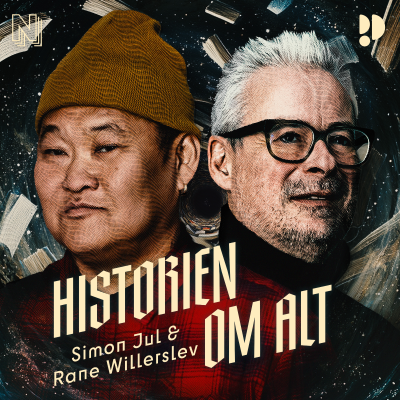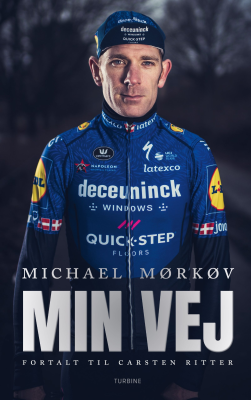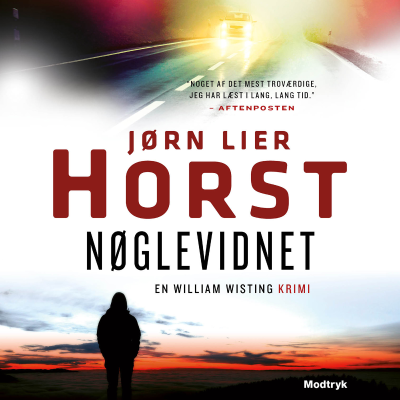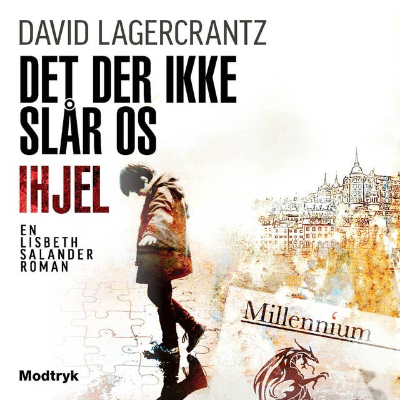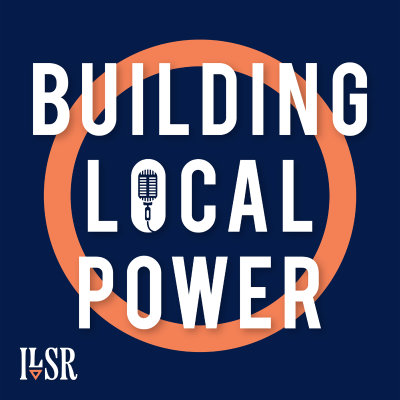
Building Local Power
Podcast af Institute for Local Self-Reliance
Prøv gratis i 7 dage
99 kr. / måned efter prøveperiode.Ingen binding.

Mere end 1 million lyttere
Du vil elske Podimo, og du er ikke alene
Rated 4.7 in the App Store
Læs mere Building Local Power
The Institute for Local Self-Reliance’s podcast presenting empowering stories and transformative ideas that break monopoly power and drive community resilience, equitable economies, and sustainable futures.
Alle episoder
434 episoderWhen ILSR co-founder David Morris published his pamphlet The Dawning of Solar Cells in 1975, nearly the only people using solar power were those in the Apollo program at NASA. Yet David saw decades into the future as he laid out a vision for community control and local ownership of a solar power system that was better for the climate and kept much more money in local economies than utility monopolies ever would. In many ways, says ILSR co-director and leader of the Energy Democracy Initiative, John Farrell, the world is still catching up with things David Morris wrote 50 years ago. John Farrell is this week's guest. To hear him tell it, one of the most important lessons he took from David Morris was that the idea of clean energy itself isn't enough. In addition to the climate, we must also think about who owns energy and the systems that provide it. If clean energy systems are owned and controlled by energy monopolies, communities still find themselves at the mercy of huge corporations. A true energy revolution will come not only from clean energy, but community-owned clean energy. That's the path to energy self-reliance. That's the path that David Morris charted decades ago, and it's the path that John Farrell and ILSR's energy democracy team follow to this day. For transcript and related resources, see the episode page at https://ilsr.org/articles/blp-why-clean-energy-is-not-enough
On this week's episode of Building Local Power, we continue our series honoring ILSR's co-founder David Morris, who passed away in June. One way to measure the impact of someone's work is to measure their influence on those they mentored. And if you ask Stacy Mitchell, the word "influence" isn't even sufficient for what she learned from David Morris. Hired into an entry-level position at ILSR by David Morris in 1997, Mitchell now leads the Independent Business Initiative and co-directs the entire organization. Her time working with Morris led to a long and distinguished career at ILSR and in the broader antimonopoly movement. On this episode, Mitchell shares her reflections on her time working with Morris and on the impact of his work overall. Listen for her insights about how prescient Morris's work is proving to be, as well as his demanding curiosity and tireless advocacy. Ultimately, Mitchell claims, Morris's philosophy is a blueprint for what it means to build local power, and Morris did that until the very end of his life. Don't miss this stirring conversation about one revolutionary's impact on another. For transcript and related resources, see the episode page at https://ilsr.org/articles/blp-the-problems-you-can-solve
Here at the Institute for Local Self-Reliance, we recently received some shocking news as we learned of the sudden passing of our beloved co-founder, David Morris. A giant in the antimonopoly field, an innovative thinker ahead of his time, and a crucial mentor to so many of us here at ILSR, David will be missed. I imagine I wasn’t alone in diving into ILSR’s archives to understand and revisit David’s work and legacy in the wake of his death. Reading David’s work from the last 50 years reminded me just how much he deeply understood about building local power, often well before political discourse arrived at the same conclusions. That’s the inspiration for this week’s episode of Building Local Power. Today, we’re revisiting episode 22 of Building Local Power, a 2017 interview between David Morris and ILSR's Community Broadband Initiative director, Chris Mitchell. What struck me about this interview was how much of it could be said today and how much David anticipated our current moment. In the interview you’re about to hear, when asked about the source of local power, David explained that the communal nature of cities has had massive power since medieval times. In doing so, David lauds the value of so-called “Sanctuary Cities,” asserting that the term really means mutual protection against a faraway federal government that doesn’t necessarily act in the city’s interest. Such thoughts are almost painfully relevant in the wake of June 14th’s “No Kings” rallies, as those in power cynically exploit tensions about the alleged dangers of cities. There are those who say cities should not be sanctuaries. One of the many pieces of wisdom we have from David Morris’s long career runs counter to that: cities have dramatic potential for their residents to protect each other, and to act in each other’s best interest. That’s how local power is built. I hope you enjoy revisiting this 2017 interview as much as I did. For transcript and related resources, see the episode page at https://ilsr.org/articles/blp-what-cities-can-do
The 2021 Infrastructure Investment and Jobs Act represented one of the largest ever investments in broadband infrastructure. Many in the digital equity space believed the bill would go a long way to solve the digital divide. Provisions like the Digital Equity Act promised to be powerful tools in ensuring fast and reliable Internet access for all, regardless of money, race, and the rural/urban split. Groups ILSR's Community Broadband Networks team supports got to work applying for and receiving government funds to make major progress bringing equity to the digital space. Then, on a Thursday night in May 2025, President Trump announced on Truth Social that he was cancelling the Digital Equity Act, freezing or suspending all grants awarded for it. The President's decision will likely face legal challenges because the act and the money appropriated for it represent an action that Congress has already taken. Still, the law's cancellation will have wide-ranging and devastating consequences in the digital equity space. Efforts to close the digital divide for the eight populations served by the bill are now halted in their tracks, just as they were gathering speed. On this week's Building Local Power, we are joined by Sean Gonsalves, ILSR’s associate director for communications on the Community Broadband Team. Sean brings his years of experience and expertise to explain to us the consequences and impacts of the cancellation of the Digital Equity Act. For transcript and related resources, see the episode page at https://ilsr.org/articles/blp-increasing-internet-access-at-the-speed-of-trust
The United States government is one of the biggest purchasers in the world. Few people or entities spend more money on more goods and services. Add state and local governments to the mix, and you have a massive market with the potential for a lot of businesses to make a lot of money. The process of governments purchasing from businesses, called procurement, quietly hums with billions of dollars every single day. Yet those billions overwhelmingly end up in the pockets of huge corporations and monopolies instead of the local company in your town, which contributes to your local economy and builds local power for your community. This often happens even if that local company is perfectly poised to deliver the exact goods or services needed with top-of-the-line service, speed, and pricing. The game is just rigged. There are many reasons for this. There are also ways to fight it. Enter Paola Santana, whose company, Glass, is working to revolutionize the procurement process in favor of local businesses. Glass’s platform G-Commerce works in many ways to fill the gaps in the procurement process. G-Commerce aims to dismantle the barriers to entry facing small and local businesses. By certifying local businesses and giving them direct access to government purchasers, G-Commerce wants to level the playing field and make small government purchases more possible for local businesses. According to Paola Santana, this is a win-win: local businesses earn lucrative sales, and local governments get better service and even better prices. Paola Santana joins us today on Building Local Power to explain all this and why it’s so important. For transcript and related resources, see the episode page at https://ilsr.org/articles/blp-the-human-side-of-government-work

Rated 4.7 in the App Store
Prøv gratis i 7 dage
99 kr. / måned efter prøveperiode.Ingen binding.
Eksklusive podcasts
Uden reklamer
Gratis podcasts
Lydbøger
20 timer / måned








